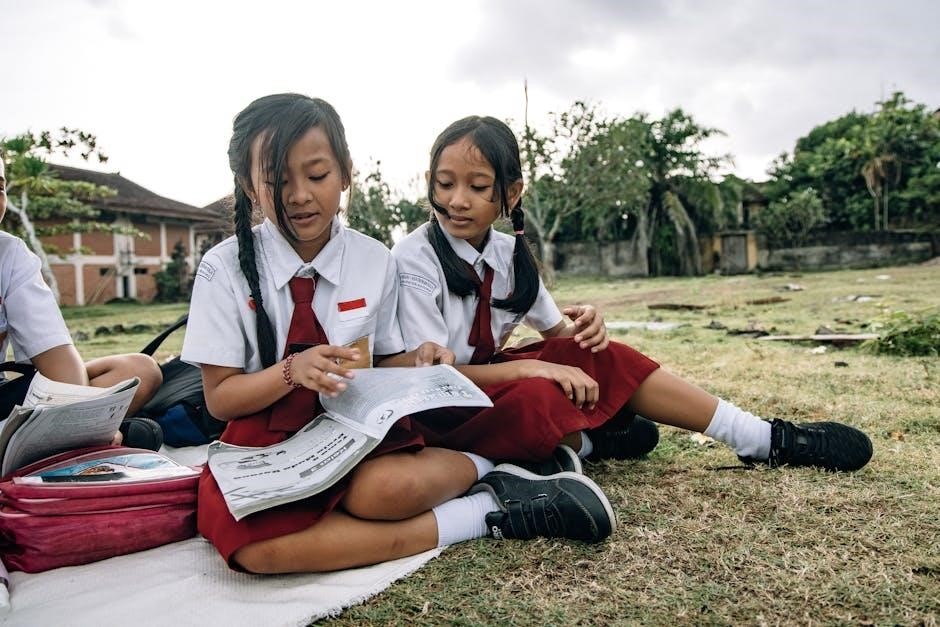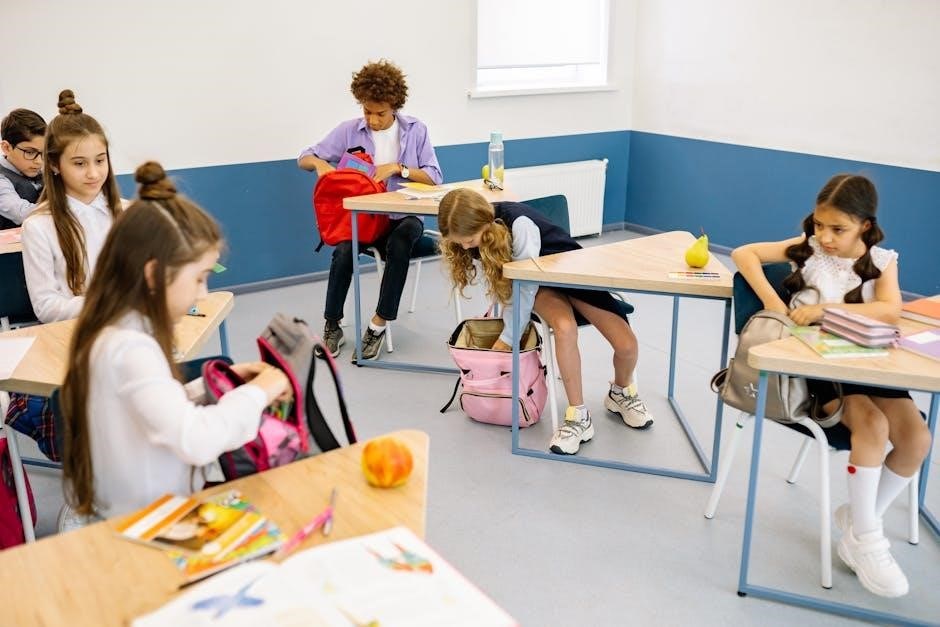The Singapore Primary School English Curriculum focuses on developing language skills through structured syllabi like ELS 2020‚ emphasizing communication‚ comprehension‚ and creativity. Textbooks and digital resources‚ including PDFs‚ support modern learning needs‚ ensuring accessibility and engagement for all students.
1.1 Overview of the English Language Syllabus 2020 (ELS 2020)
The English Language Syllabus 2020 (ELS 2020) is designed to develop students’ language skills through a focus on communication‚ comprehension‚ and creativity; It emphasizes phonics‚ vocabulary‚ and critical thinking‚ preparing students for a globalized world. The syllabus integrates digital resources‚ including PDF textbooks‚ to support modern learning needs and ensure accessibility for all students. By fostering a strong foundation in English‚ ELS 2020 equips students with essential skills for future careers and lifelong learning. The curriculum emphasizes English as a lingua franca‚ preparing students to thrive in diverse environments and contributing to Singapore’s role as a global hub for education and innovation. This structured approach ensures students develop proficiency and confidence in using English effectively.
1.2 Importance of English Proficiency in Singapore
English proficiency is a cornerstone of Singapore’s education system‚ fostering global communication and academic success. It equips students with essential skills for future careers and lifelong learning. The curriculum emphasizes English as a lingua franca‚ preparing students to thrive in diverse environments and contributing to Singapore’s role as a global hub for education and innovation. By mastering English‚ students gain a competitive edge in an increasingly interconnected world. This proficiency also enables them to access a wide range of educational and professional opportunities‚ both locally and internationally. Thus‚ the focus on English in Singapore’s primary schools lays a strong foundation for future success and global engagement.

1.3 Key Objectives of Primary School English Education
The primary school English education in Singapore aims to develop students’ language skills through structured syllabi like the English Language Syllabus 2020 (ELS 2020). The key objectives include fostering effective communication‚ improving comprehension‚ and nurturing creativity. The curriculum emphasizes phonics‚ vocabulary‚ and critical thinking to prepare students for a globalized world. Textbooks and digital resources‚ such as PDFs‚ are designed to support these goals‚ providing engaging content and activities. The education system also focuses on fostering a love for reading and ensuring equitable learning opportunities. By aligning with these objectives‚ primary school English education in Singapore equips students with essential skills for academic and lifelong success‚ while promoting a strong foundation in the English language.
Popular Textbooks and Resources
Popular textbooks include English Plus and My World of English‚ designed to align with the curriculum‚ fostering language development through engaging content and activities‚ available in PDF formats.
2.1 English Plus Series: Features and Benefits
The English Plus Series is a widely used resource for primary school students in Singapore‚ offering structured lessons and engaging activities. Available in PDF formats‚ it includes Student Books and Workbooks for Year 5 and 6‚ aligning with curriculum goals. The series focuses on developing foundational skills such as grammar‚ vocabulary‚ and comprehension‚ while also fostering higher-order thinking. Its interactive exercises and real-life contexts make learning enjoyable and relevant. Teachers appreciate its clear structure‚ while students benefit from the progression of difficulty that builds confidence. The series is particularly popular for its balance between academic rigor and accessibility‚ making it a preferred choice for both educators and learners in Singapore’s primary schools.
2.2 My World of English Textbooks: Structure and Content
My World of English textbooks are designed to cater to the needs of primary school students‚ focusing on foundational language skills. These texts‚ available in PDF formats‚ introduce basic language concepts through engaging activities and stories. The content is structured to foster a love for reading and speaking‚ ensuring a solid linguistic base for young learners. Each textbook includes grammar exercises‚ comprehension tasks‚ and interactive elements to make learning enjoyable. The series aligns with the curriculum goals‚ providing a comprehensive approach to English learning. By incorporating relatable themes and visual aids‚ My World of English textbooks create an interactive and immersive learning experience‚ making them a valuable resource for students and educators in Singapore’s primary schools.
2.3 Approved Textbook List (ATL) for Primary Schools
The Approved Textbook List (ATL) for Primary Schools is a curated selection of textbooks endorsed by the Ministry of Education to align with the English Language Syllabus 2020. Updated annually‚ the ATL ensures that schools have access to high-quality resources that meet curriculum standards. Textbooks like English Plus and My World of English are prominently featured‚ offering structured lessons and engaging content. The ATL also includes digital resources‚ such as PDF versions of textbooks‚ to support modern learning needs. Schools can access these materials through platforms like FreeKidsBooks.org‚ ensuring accessibility and flexibility. The ATL plays a crucial role in maintaining educational quality‚ providing educators with trusted resources to foster effective English language learning in primary schools across Singapore.

Digital Resources and PDF Materials
Digital resources and PDF materials‚ such as Raz-Kids and TumbleBook Library‚ enhance accessibility and engagement for English learning‚ offering interactive content and aligning with curriculum goals.
3.1 Availability of PDF Textbooks and Workbooks
Premium textbooks like English Plus and My World of English are available as PDFs‚ offering convenience for students and teachers. These digital versions‚ accessible through platforms like FreeKidsBooks;org‚ support home-based learning and cater to diverse learning needs. The PDF format ensures that students can easily access materials‚ promoting consistent and engaging English language development in both classroom and remote settings. Additionally‚ supplementary materials like Raz-Kids and TumbleBook Library provide interactive e-books‚ enhancing primary students’ reading skills. Free PDF resources from websites such as FreeKidsBooks.org offer additional practice‚ complementing textbooks like English Plus and My World of English. These materials support diverse learning needs‚ ensuring comprehensive English proficiency through engaging and accessible content for Singaporean students.
3.2 Role of Digital Platforms in English Learning
Digital platforms like Raz-Kids and TumbleBook Library play a pivotal role in enhancing English learning for primary students. These platforms offer interactive and engaging experiences‚ providing access to leveled eBooks‚ quizzes‚ and tracking tools. Raz-Kids allows students to progress at their own pace‚ while TumbleBook Library features animated‚ talking picture books that captivate young learners. These resources promote reading fluency‚ comprehension‚ and a love for reading. They also support differentiated instruction‚ catering to diverse learning needs. By integrating AI and machine learning‚ these platforms offer personalized learning paths and real-time feedback‚ making English education more dynamic and effective. Such innovative tools ensure that students develop essential language skills in a modern‚ engaging‚ and accessible manner‚ aligning with Singapore’s commitment to leveraging technology for education.
3.3 Accessing Free PDF Books from Websites Like FreeKidsBooks.org
Websites like FreeKidsBooks.org provide a wealth of free PDF books that cater to primary school students in Singapore. These resources offer engaging stories‚ grammar exercises‚ and comprehension activities‚ designed to foster a love for reading and improve language skills. The PDF format ensures easy accessibility‚ allowing students to download and use materials both at home and in the classroom. Many of these books align with the English Language Syllabus 2020 (ELS 2020)‚ focusing on communication‚ comprehension‚ and creativity. Additionally‚ these websites often include supplementary materials such as worksheets and activity books‚ making them a valuable resource for both students and educators. By providing free access to quality educational content‚ platforms like FreeKidsBooks.org support equitable learning and promote academic success for all students in Singapore.

Engaging Reading Programs and Initiatives
Singapore primary schools implement reading programs like Book Buzz and Read Swap Share to foster a love for reading through storytelling‚ discussions‚ and interactive activities‚ enhancing language skills and creativity.
4.1 Book Buzz and Read Swap Share Programs
Book Buzz and Read Swap Share are innovative reading initiatives in Singapore primary schools designed to nurture a love for reading among students. These programs encourage students to explore diverse texts through activities like book rotations‚ storytelling sessions‚ and interactive discussions. By fostering engagement and critical thinking‚ these initiatives help students develop essential language skills and comprehension abilities. The programs also promote collaboration and creativity‚ allowing students to share insights and perspectives on the books they read. Through these activities‚ students gain confidence in their reading abilities and develop a deeper appreciation for literature. These programs are integral to the English curriculum‚ supporting the broader goals of fostering lifelong learners and proficient communicators in a globalized world.
4.2 Role of School Libraries and eResources
School libraries and eResources play a vital role in supporting English education in Singapore primary schools. They provide access to a wide range of books‚ including physical copies and digital versions‚ catering to diverse learning needs. Libraries often feature interactive platforms like the TumbleBook Library and NLB’s eResources‚ which offer animated books‚ eBooks‚ and educational materials. These resources enrich students’ reading experiences‚ promote leisure reading‚ and align with curriculum goals. By providing access to both traditional and digital materials‚ libraries help students develop essential skills such as comprehension‚ critical thinking‚ and a lifelong love for reading. This dual approach ensures that all students can engage with English materials in ways that suit their learning styles and preferences‚ fostering academic success and personal growth. Libraries remain a cornerstone of holistic English education in Singapore.
4.3 Interactive Platforms: Raz-Kids and TumbleBook Library
Raz-Kids and TumbleBook Library are transformative interactive platforms enhancing English learning in Singapore primary schools. Raz-Kids offers leveled eBooks‚ quizzes‚ and progress-tracking tools‚ enabling personalized reading experiences. TumbleBook Library features animated‚ talking picture books that captivate young learners. Both platforms foster reading fluency‚ comprehension‚ and a love for literature. They support differentiated instruction‚ catering to diverse learning needs and skill levels. These digital resources align with curriculum goals‚ providing engaging and accessible content. By integrating technology with education‚ Raz-Kids and TumbleBook Library create dynamic learning environments that inspire students to explore and master the English language effectively. These platforms are invaluable for modern‚ interactive English education in Singapore.

Challenges and Solutions
Addressing the digital divide and ensuring equitable access to PDF materials are key challenges. Initiatives like Raz-Kids and TumbleBook Library help bridge gaps‚ fostering inclusivity and effective learning.
5.1 Ensuring Accessibility of PDF Materials
Ensuring accessibility of PDF materials is crucial for equitable learning. Schools address the digital divide by providing devices and internet access to underprivileged students. Platforms like Raz-Kids and TumbleBook Library offer downloadable resources‚ while supplementary materials and structured reading programs enhance accessibility. These initiatives ensure all students can benefit from digital and offline learning opportunities.
5.2 Addressing the Digital Divide in Education
Addressing the digital divide is essential to ensure equitable access to education. Singapore has implemented initiatives to provide devices and internet access to underprivileged students‚ bridging the gap in digital resources. Schools utilize platforms like Raz-Kids and TumbleBook Library to offer accessible PDF materials‚ ensuring all students can benefit from digital learning tools. Additionally‚ programs such as Book Buzz and Read Swap Share promote inclusivity by encouraging shared reading experiences. These efforts aim to create a level playing field‚ enabling every student to thrive in a technology-driven educational environment. By addressing the digital divide‚ Singapore fosters an inclusive and supportive learning ecosystem for all primary school students.
5.3 Initiatives to Promote Equitable Learning
Singapore has introduced various initiatives to promote equitable learning‚ ensuring all students access quality education. Programs like Raz-Kids and TumbleBook Library offer interactive digital resources‚ including PDF books‚ to support diverse learning needs. Supplementary materials from websites such as FreeKidsBooks.org provide additional practice‚ complementing textbooks like English Plus and My World of English. These resources cater to different learning styles‚ ensuring comprehensive English proficiency. Furthermore‚ reading initiatives like Book Buzz and Read Swap Share encourage a love for reading‚ while school libraries and eResources enrich learning experiences. By fostering inclusivity and accessibility‚ these initiatives ensure that every student can benefit from engaging and effective educational content‚ promoting equitable learning opportunities across Singapore’s primary schools.

Future Trends and Innovations
AI and machine learning will enhance Singapore’s English education‚ promoting personalized learning. Sustainable PDF resources and Open Educational Resources will foster innovation and accessibility in primary schools.
6.1 Integration of AI and Machine Learning in Teaching

The integration of AI and machine learning in Singapore’s primary school English education is revolutionizing how students learn. These technologies provide personalized learning paths‚ offering real-time feedback and adaptive assessments. Platforms like Raz-Kids and TumbleBook Library leverage AI to create interactive‚ engaging experiences. For instance‚ AI-driven tools can analyze a student’s reading level and recommend appropriate eBooks‚ ensuring each child progresses at their own pace. Additionally‚ intelligent tutoring systems assist with grammar and comprehension‚ catering to individual needs. This innovative approach not only enhances efficiency but also makes learning dynamic and tailored‚ preparing students for a tech-driven future while maintaining a strong foundation in English proficiency.

6.2 Sustainable Use of PDF Resources
The sustainable use of PDF resources in Singapore’s primary school English education ensures long-term accessibility and environmental efficiency. Digital textbooks like English Plus and My World of English‚ available in PDF formats‚ reduce reliance on physical books‚ lowering carbon footprints. Schools can access these materials indefinitely‚ promoting consistent learning without waste. Regular updates to PDF resources keep content relevant‚ aligning with curriculum goals like ELS 2020. However‚ addressing the digital divide remains crucial to ensure all students benefit. Initiatives providing devices and internet access support equitable learning‚ making PDF resources a sustainable and inclusive choice for future generations. This approach balances innovation with environmental responsibility‚ fostering a modern yet eco-conscious education system.
6.3 The Role of Open Educational Resources (OER)
Open Educational Resources (OER) play a vital role in Singapore’s primary school English education by providing free‚ adaptable materials. These resources‚ including worksheets‚ lesson plans‚ and activity books‚ align with curriculum goals like ELS 2020. OER offers flexibility‚ allowing teachers to customize content for diverse learning needs‚ fostering creativity and critical thinking. Websites like FreeKidsBooks.org provide access to engaging stories and educational tools‚ supporting literacy development. OER promotes inclusivity by ensuring all students‚ regardless of background‚ can access quality materials. This approach not only enhances learning but also encourages collaboration among educators‚ creating a rich‚ dynamic educational environment. By integrating OER‚ Singapore’s education system continues to innovate‚ ensuring equitable and high-quality learning experiences for all primary school students.
Singapore’s primary school English curriculum effectively integrates textbooks and digital resources‚ fostering language skills and creativity. PDF materials and initiatives ensure accessibility‚ preparing students for future success.
7.1 Summary of Key Points
The Singapore Primary School English Curriculum emphasizes foundational skills‚ creativity‚ and critical thinking through structured syllabi like ELS 2020. Textbooks such as English Plus and My World of English‚ available in PDF formats‚ align with curriculum goals. Digital resources like Raz-Kids and TumbleBook Library enhance accessibility and engagement‚ while initiatives like Book Buzz and Read Swap Share foster a love for reading. The integration of PDF materials ensures equitable learning‚ addressing the digital divide and promoting sustainability. These resources‚ combined with interactive platforms‚ create a comprehensive approach to English education‚ preparing students for future success and lifelong learning.
7.2 Importance of Continuous Improvement in English Education
Continuous improvement in English education is vital for equipping students with evolving language skills and meeting global demands. The integration of technology‚ such as AI and machine learning‚ enhances teaching methods and personalizes learning. PDF resources and digital platforms like Raz-Kids and TumbleBook Library ensure accessibility and engagement‚ fostering a love for reading and learning; By regularly updating syllabi and incorporating innovative tools‚ Singapore’s education system remains at the forefront of English proficiency. This commitment to progress not only prepares students for future challenges but also strengthens Singapore’s reputation as a global leader in education‚ ensuring learners are well-equipped to thrive in an increasingly interconnected world.


